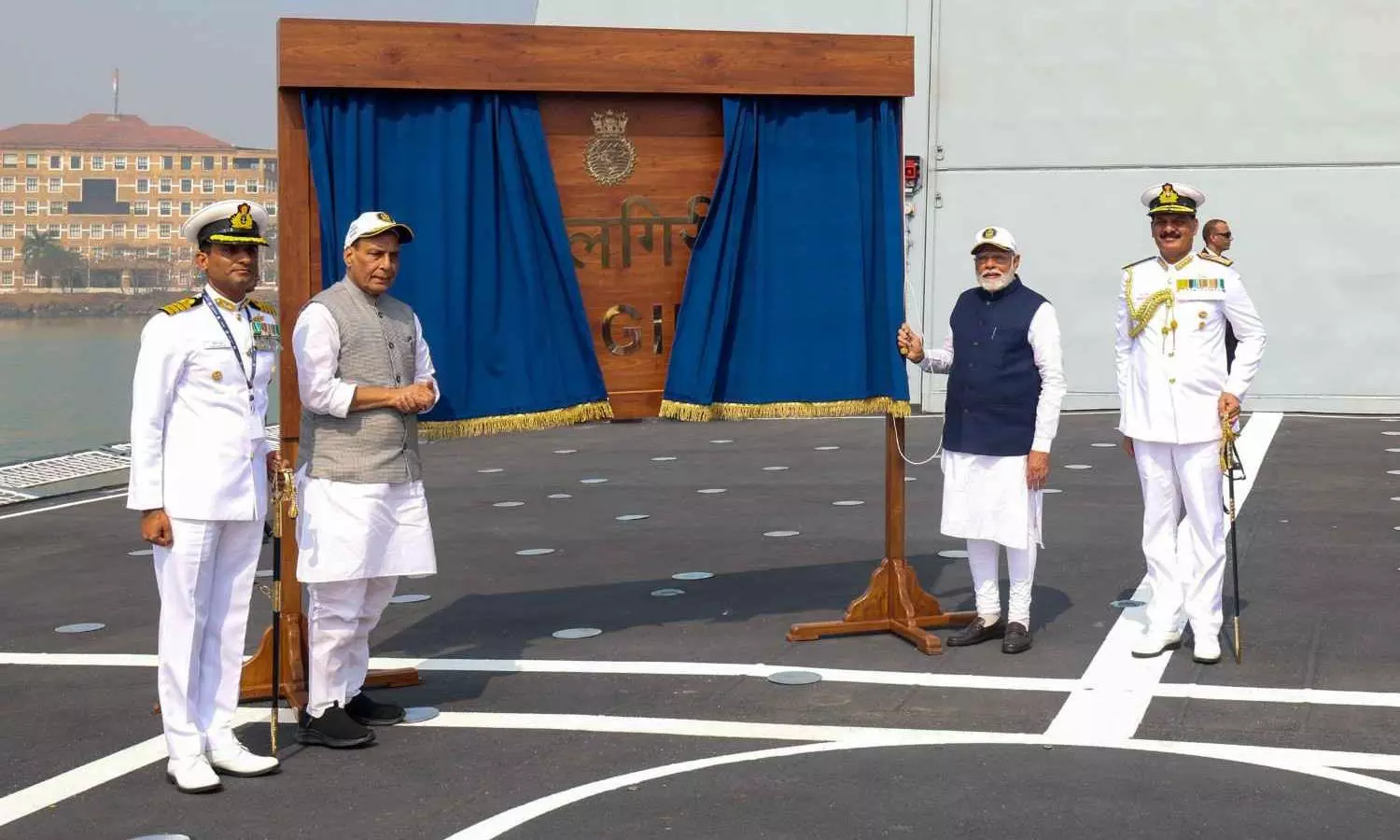
PM advocates open, inclusive Indo-Pacific at naval warship commissioning

Mumbai, Jan 15 (PTI) Prime Minister Narendra Modi on Wednesday said India is emerging as a major maritime power, and being recognised as a reliable and responsible partner globally as he pitched for an open, secure, inclusive and prosperous Indo-Pacific region.
During his day-long visit to Mumbai, nearly two months after the BJP-led Mahayuti bloc stormed back to power in Maharashtra with a landslide mandate, the PM attended the commissioning of three naval warships, inaugurated an ISKCON temple and met ruling alliance MLAs over lunch.
"We should become a global partner in securing the sea from drugs, weapons, and terrorism, and make it safe and prosperous," he said, adding India's growing naval strength is enhancing global confidence in the country.
He was speaking after three new naval platforms -- a destroyer, a frigate and a submarine -- were commissioned at a ceremony in his presence at the Naval Dockyard.
Pointing out that three warships were being commissioned together for the first time in the country's history, the Prime Minister underlined the nation's progress in defence production, maritime security and economic growth under the 'Atmanirbhar Bharat' initiative.
The PM reasserted the country's commitment to becoming a global maritime leader. "India is on its way to becoming a leading maritime power and a global economic force. With modernised defence capabilities and a robust shipbuilding ecosystem, we are opening new doors to economic growth and self-reliance," he said.
Noting the strategic importance of the Indian Ocean region, he emphasised the need to protect territorial waters, ensure freedom of navigation, and secure trade supply lines.
Modi drew attention to India's significant contributions as a maritime nation. "In the Indian Ocean region, India has emerged as the 'first responder,' saving hundreds of lives and securing thousands of crores worth of national and international cargo," he said.
India's vision of a secure and inclusive Indo-Pacific region aligns with its broader global responsibilities, he said.
"India has always supported an open, secure, inclusive and prosperous Indo-Pacific region," the PM emphasised.
It may be noted that China has territorial disputes with many countries in the strategic Indo-Pacific region.
India's defence production has crossed Rs 1.25 lakh crore, with exports reaching more than 100 countries, he noted.
"In the last decade, 39 of the 40 naval vessels inducted were built in Indian shipyards, reflecting our commitment to 'Make in India'," he said.
On deep-sea exploration, Modi spoke about the Samudrayaan project, which will enable scientists to reach depths of 6,000 metres.
"This initiative reflects India's commitment to harnessing the potential of deep-sea resources," he said, emphasising the strategic importance of the ocean for future opportunities.
Referring to the Navy's adoption of indigenous symbols inspired by the 17th century Maratha warrior king Chhatrapati Shivaji Maharaj, Modi said, "This reflects our resolve to free ourselves from colonial legacies while embracing our heritage." Earlier, the PM witnessed the commissioning of warships INS Surat, INS Nilgiri, and INS Vaghsheer.
INS Nilgiri, the lead ship of the Project 17A stealth frigate class, is equipped with advanced stealth technology and reduced radar signatures, making it a significant advancement over its predecessors.
INS Surat, the final vessel of the Project 15B stealth destroyer class, enhances the Navy's surface fleet with improvements in design and capability. Built by MDL, it complements India's advanced naval fleet.
INS Vaghsheer, the sixth submarine under the Scorpene-class Project 75, is designed for roles such as anti-surface warfare, anti-submarine warfare, and intelligence gathering.
In the evening, the PM travelled to Kharghar in adjoining Navi Mumbai to inaugurate an ISKCON (International Society for Krishna Consciousness) temple.
Addressing a gathering on the occasion, he said India's spiritual culture is deeply rooted in the spirit of service and his government has been working selflessly for people's welfare for more than a decade.
Modi, who assumed office for a third time in June last year, emphasised his government has launched a slew of welfare measures like building toilets, homes for the poor and providing LPG connections to poor women and medical insurance to citizens.
"This spirit of service brings true social justice and is a symbol of true secularism. The main foundation of our spiritual culture is the spirit of service. India is not just a piece of land surrounded by geographical boundaries. It is a living land, living culture. Knowledge is spirituality and if we want to understand India, we have to imbibe spirituality," he underlined in his speech.
He said followers of ISKCON, a global bhakti movement founded on the Bhagavad Gita teachings, across the world are connected to each other by their devotion to Lord Krishna.
Modi said the spirit of service propagated by the ISKCON movement inspires the youth and helps them create a sensitive society which promotes human values.
The PM expressed confidence that the temple complex, spread across nine acres, will become a sacred centre enriching India's consciousness along with faith.
"ISKCON followers worldwide are united by their devotion to Lord Krishna," emphasised Modi and highlighted that another connecting thread is the teachings of the movement's founder, Srila Prabhupada Swami, which guide the devotees round-the-clock. PTI

